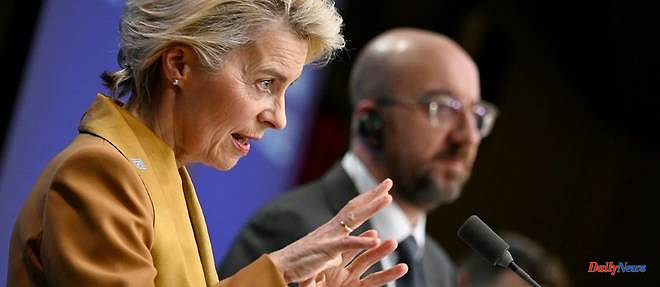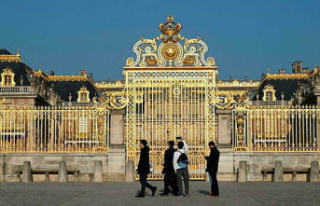The Franco-German disputes over the place of nuclear power in the fight against climate change and the ban on heat engines in 2035 were invited to the summit of EU heads of state and government on Thursday.
Gathered for two days in Brussels, the leaders of the Twenty-Seven notably discussed Ukraine and the means of strengthening the competitiveness of the European economy, an issue on which supporters and detractors of nuclear power are opposed.
"Nuclear energy? It's not safe, not fast, not cheap and it's not climate friendly. With European flags on it, it would be a scam", launched on his arrival, Xavier Bettel, Prime Minister of Luxembourg, ally of Berlin in the rejection of the atom.
A Franco-German bilateral meeting is scheduled for Friday morning as relations between the two countries have been strained for months.
The context is difficult for French President Emmanuel Macron, faced with demonstrations in France against his pension reform. But also for German Chancellor Olaf Scholz, entangled in the divisions of his coalition.
Paris and Berlin clashed last week on the place of nuclear power in a proposal for a European Commission regulation on industrial policy.
France and a dozen states that rely on this technology wanted to obtain recognition of the atom in the means to be supported to decarbonize the economy, against the advice of Germany and a handful of anti-nuclear countries.
Eventually, Paris got nuclear mentioned, snatching a symbolic victory. But, in practice, the sector will benefit from almost none of the advantages provided for by the text, such as the acceleration of project authorization procedures or the financing facilities that will benefit renewable energies.
"Nuclear power can play a role in decarbonization efforts (...) But only zero-emission technologies deemed strategic for the future will have full access to the advantages and benefits (of the text), this is the case for nuclear technologies of cutting edge in some areas, but not all", admitted Commission President Ursula von der Leyen on Thursday evening.
A battle is already looming to redraft the text during negotiations among member states and in the European Parliament.
Another bone of contention: the automobile. Germany shocked its partners in early March by blocking a key text of the European climate plan on CO2 emissions from cars that it had already approved.
This text, which will de facto impose 100% electric engines for new vehicles from 2035, was the subject of an agreement in October between Member States and European Parliament negotiators, formally approved in mid-February by MEPs.
To justify its volte-face, extremely rare at this stage of the procedure, Germany demanded that the Commission present a proposal opening the way to vehicles running on synthetic fuels.
This technology, still under development, would consist in producing fuel from CO2 resulting from industrial activities. Defended by top-of-the-range German and Italian manufacturers, it would make it possible to prolong the use of heat engines; but environmental NGOs consider it costly, energy-intensive and polluting.
The EU executive is conducting complex discussions with Berlin: the idea is that it specifies, in a separate text, how the EU can in future give a green light to synthetic fuels, without calling into question its CO2 reduction.
"It's just a question of finding the right way to implement this long-standing promise by the Commission (...) it's on the right track," said Chancellor Olaf Scholz.
"We are intensifying the talks, I am convinced that we will soon find a good solution (...) there is a will on both sides to resolve the issue, within the framework of the provisional agreement reached between the Council and the Parliament" , added Ms. von der Leyen on Thursday evening.
Several officials are worried about a questioning of EU procedures, likely to derail other texts, in particular the climate plan.
"The whole European decision-making architecture would crumble if we all act like this," criticized Latvian Prime Minister Krisjanis Karins.
“We cannot go back on the agreements reached, it is a question of the credibility of the legislative process”, of which we must keep the “essential predictability”, hammered the President of the European Parliament Roberta Metsola.
23/03/2023 23:23:13 - Bruxelles (AFP) - © 2023 AFP












